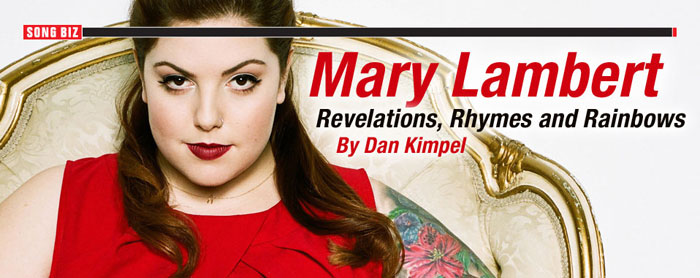She is not a shrinking violet, this Mary Lambert. “I love performing. I love the sound of my own voice. I love being the star,” she says. The lyrics of her lead single, “Secrets,” reflect her remarkable candor as she sings, “I don’t care if the world knows what my secrets are.” Polished pop, vivid ballads, spoken word interludes and anthems of self-empowerment: With her first full-length release, Heart On My Sleeve, Lambert reveals a strikingly expressive tableaux.
From Everett, WA, Lambert was raised Pentecostal. “We left the church and I joined the Evangelical church in high school, which I loved,” she recalls. “They had the hippest bands and the funniest pastors telling jokes, but it was still, ‘You’re gay, so you’re sinning.’ It was such a mind fuck.”
Lambert, who endured horrendous sexual abuse as a child, was diagnosed as bipolar. She channeled her creative instincts into learning guitar and studying classical composition. She commanded slam poetry stages and released a book, 500 Tips for Fat Girls, that predicted her future as a fearless communicator.
A massive audience met Lambert when she wrote and performed the hook on “Same Love” by Macklemore & Ryan Lewis after a friend recommended her to the duo. Within three short hours of receiving the track she had penned the chorus to the song that was nominated for two Grammy Awards: Song of the Year and Record of the Year. “I had three hours to come up with the most brilliant shit ever,” says Lambert. “I had a shot of tequila and got down to business.”
Lambert joined Macklemore & Ryan Lewis at the Grammy Awards for the onstage marriage of 33 couples, officiated by Queen Latifah, and joined by Madonna. “She was incredibly kind to me,” says Lambert of Madonna. “Working with a legend, there were some things I was scared to say, and things I was eager to ask. I really wanted to learn from her.”
While Lambert has two previous EP’s to her credit, creating a full-length release was a completely different process. The project’s producers are Eric Rosse and Benny Cassette, with songs credited to Lambert with her producers and Mozella, best known for “Wrecking Ball” by Miley Cyrus. “I had some songs previously that I had worked out with Eric Rosse, but we then realized that we were writing the record while we were making it. So all of these songs were written in the last nine months,” says Lambert.
Co-writing was a new experience. “Previously, I’d written all my stuff crying on the kitchen floor, drunk out of my mind thinking the only way I could create was in shitty chaos. Now I was sober and alert and having people in the room and writing about fun things.”
Lambert says that Mozella was helpful in the editing process. “When I write I have a hundred different ideas, and sometimes that one melody idea I’ve tucked away is the right answer. It was so helpful to have her say, ‘There––that one, that’s your chorus.’” One of the song’s most affecting ballads, “Monochromatic,” owes its title to Lambert’s co-writer. “That was Mozella’s word,” confirms Lambert.
The sole cover on Heart on My Sleeve is a ballad version of the Rick Springfield hit “Jessie’s Girl.” Lambert says that it was originally recorded to pitch to Grey’s Anatomy. “I was asked to do a cover of an ‘80s tune. I thought of ‘Jessie’s Girl,’ and the gender neutrality of the name ‘Jessie,’ and how many times in the gay community can you be attracted to someone who is straight? It happens to everybody.”
On her website (http://marylambertsings.com) fans leave Lambert impassioned messages. Many of them are from teenage girls working to overcome negative body images, homophobia and fear. “We are more than our scars,” sings Lambert on “Sum of Our Parts.” For Lambert and her fans, it is a connective creed. “I know everyone says this, but I have the best fans ever—communicative and kind and they defend me,” she concludes. “I am so glad that my music resonates with them.”











